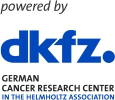Speaker
Description
The development of immune-related adverse events (irAEs) in cancer patients receiving immune checkpoint inhibitors (ICIs) cause morbidity, necessitates treatment cessation and limits ICI efficacy. Comparing different first- and second-line irAE treatments, we found that glucocorticosteroids, TNFα blockade, and α4β7-integrin inhibition reduced anti-tumor immunity in mice. We compared these therapies against extracorporeal photopheresis (ECP) and found that ECP has no negative effect on anti-tumor immunity in multiple preclinical tumor models. Based on these findings, we tested ECP in different ICI-colitis models and observed significantly reduced colitis severity after treatment. Mechanistically, we identified that ECP-treated splenocytes accumulate specifically in the inflamed intestinal tract, but not the tumor microenvironment. Apoptotic splenocytes were engulfed by intestinal phagocytes, which rendered these towards an anti-inflammatory phenotype. Immunosuppressive macrophages secreted adiponectin to resolve inflammation in the intestinal tract. Local adiponectin production elicited a tissue-specific effect by reducing pro-inflammatory tissue-resident memory T-cell activation, CD4+IFN-ү+ T-cells and inflammatory myeloid cells, while sparing tumor-specific T-cell development.
Following our preclinical investigations, we tested ECP in a prospective phase-Ib/II trial (EudraCT-No.2021-002073-26) with 30 patients and found low ECP-related toxicity. At week 12 of therapy, the overall response rate (ORR) for all irAEs was 96%; the ORR for colitis was 100%. The colitis-specific complete remission rate was 93%. Glucocorticosteroids could be reduced for all patients after ECP-therapy. The ECP-adiponectin axis reduced intestinal activation in patients with ICI-colitis without evidence of loss of anti-tumor immunity.
In conclusion, we identified ECP-induced adiponectin as an immunomodulatory mechanism to control ICI-induced inflammation without blocking anti-tumor immunity.
| Research type | Translational research |
|---|

